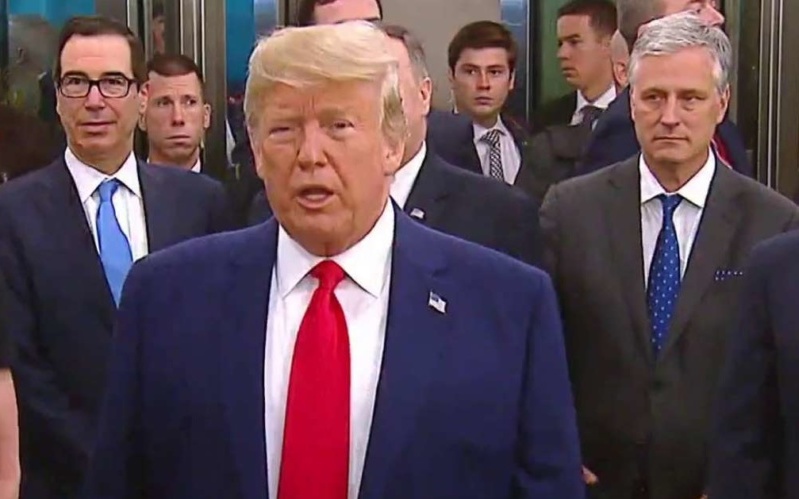Donald Trump speaks with reporters at the United Nations, New York, September 23, 2019
Donald Trump ordered his staff to freeze almost $391 million in military aid to Ukraine, days before he called the new Ukrainian President and sought an investigation — with no supporting evidence — of Democratic rival Joe Biden.
Trump sent the demand through Acting Chief of Staff Mick Mulvaney to the Pentagon and the State Department.
“Three senior Administration officials” revealed Trump’s order to The Washington Post, and The New York Times has posted a similar account.
Mulvaney was careful not to indicate Trump’s political motive. Instead the Office of Management and Budget, sending the order to the military and diplomats, spoke only of Trump’s “concern” and said that the Administration was looking at whether the aid was necessary.
The revelation adds weight to the claim of Trump’s effective ultimatum to Ukraine President Volodymyr Zelenskiy, who took office in May: investigate Biden and his son Hunter, a board member of the Ukrainian gas company Burisma, or face the aid cut-off after Russia annexed Crimea and gave military support to separatists in eastern Ukraine.
Trump has acknowledged that he spoke about Biden to Zelenskiy in the late July call, but has not confirmed the report — from multiple sources to The Wall Street Journal — that he asked the President eight times to pursue an investigation.
Trump and his allies have spread the unsupported allegation that Joe Biden, as Vice-President in 2016, intervened for the dismissal of Ukraine’s top prosecutor to block an inquiry into his son. In fact, Parliament removed Prosecutor Viktor Shokin for corruption in March 2016.
Ukraine’s current Prosecutor General said last May that there were no legal issues with Burisma and Hunter Biden.
With Trump meeting Zelenskiy at the UN General Assembly in New York this week, Ukraine Foreign Minister Vadym Prystaiko denied last weekend that Trump put any pressure on the President. He also said Kiev will not release the transcript of the phone call: “American investigators have the full right to turn to the US and get this information if they think that our president has been pressured. They can clear this up.”
“People familiar with the conversation” said Trump did not specifically mention the delay in military aid to Zelenskiy. A Ukrainian official said the Government did not learn of the suspension until about one month after the call.
From Whistleblower to Impeachment?
But the steady accumulation of information about the incident, which began with The Washington Post’s revelation last week of a complaint by a US intelligence official, is bringing renewed discussion of impeachment proceedings against Trump.
Some Democrats who have been hesitant said this week that they now favour hearings. Even House Speaker Nancy Pelosi, who has held out against any process, wrote to House colleagues of “a grave new chapter of lawlessness which will take us into a whole new stage of investigation”.
“Multiple senior House Democrats and congressional aides” said Pelosi is now gauging the mood of Democrat representatives, making calls on Monday night.
Seven first-term Democrats, all with records of service in the military, defense, and US intelligence, wrote in The Washington Post that if the allegations against Trump are true, “we believe these actions represent an impeachable offense”.
This flagrant disregard for the law cannot stand. To uphold and defend our Constitution, Congress must determine whether the president was indeed willing to use his power and withhold security assistance funds to persuade a foreign country to assist him in an upcoming election.
Trump has put out a series of agitated tweets and statements since Saturday. Yesterday he appeared to defend the withholding of aid: ““It’s very important to talk about corruption. If you don’t talk about corruption, why would you give money to a country that you think is corrupt?”
Advisors such as Secretary of State Mike Pompeo, Treasury Secretary Steven Mnuchin, and Commerce Secretary Wilbur Ross shifted uncomfortably behind Trump, who denied the ultimatum to Zelenskiy: “No, I didn’t. I didn’t do it.”
Trump then tried to attack both Joe and Hunter Biden with a series of hyperbolic, unsupported claims.
He initially said about the transcript of the call, “I hope you get to see it soon,” but moments later he angrily denied that he had endorsed its release, saying it would set a bad precedent.
On August 12, the US intelligence official lodged the complaint over Trump’s behavior and its effect on American foreign policy. The intelligence community’s Inspector General found the complaint to be of “urgent concern”, triggering the legal requirement to provide it to Congressional committees; however, Director of National Intelligence Joseph Maguire has refused to do so.
The House Intelligence Committee chair, Rep. Adam Schiff, has subpoenaed Maguire for the provision of the document. Inspector General Michael Atkinson gave three hours of closed-door testimony to the committee last Thursday, and Maguire is scheduled to appear this Thursday.
The Administration only released the aid to Ukraine on the night of September 11, after Schiff’s subpoena of Maguire.
Republican senators on the Appropriations Committee maintained that the White House decided to release the aid after Sen. Richard Durbin threatened to freeze $5 billion in Pentagon funding for next year.

